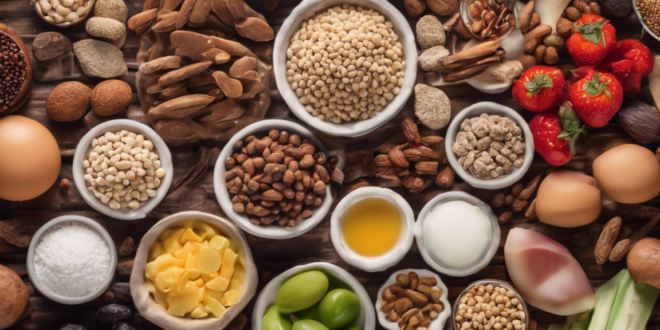Manage Your Diabetes with These 12 Protein-Rich Foods: A Comprehensive Guide to Nutritional Wellness
Living with diabetes requires careful attention to diet and nutrition. Protein plays a crucial role in managing blood sugar levels, supporting weight management, and promoting overall health for individuals with diabetes. This comprehensive guide explores 12 protein-rich foods that can help you effectively manage your diabetes while enjoying delicious and nutritious meals.
Understanding Protein’s Role in Diabetes Management
Protein is a critical nutrient for individuals with diabetes. Unlike simple carbohydrates, protein has minimal impact on blood sugar levels and provides several key benefits. It helps slow down glucose absorption, promotes feelings of fullness, supports muscle maintenance, and assists in stabilizing blood sugar fluctuations. By incorporating strategic protein sources into your diet, you can create a more balanced and effective approach to diabetes management.
The Top 12 Protein-Rich Foods for Diabetic Nutrition
1. Lean Chicken Breast: The Protein Powerhouse
Skinless chicken breast stands out as an exceptional protein source for diabetic individuals. With approximately 31 grams of protein per 100 grams and virtually no carbohydrates, chicken provides a lean protein option that supports muscle health without causing significant blood sugar spikes. Its versatility allows for numerous cooking methods, from grilling and baking to stir-frying, making it an easy addition to various meal plans.
2. Salmon: Omega-3 Rich Protein with Added Benefits
Wild-caught salmon offers a remarkable combination of high-quality protein and heart-healthy omega-3 fatty acids. Each 3-ounce serving provides approximately 22 grams of protein and contains essential nutrients that can help reduce inflammation and improve insulin sensitivity. The omega-3s in salmon have been shown to support cardiovascular health, which is particularly important for diabetic patients.
3. Greek Yogurt: Probiotic Protein Support
Low-fat Greek yogurt is a nutritional powerhouse for diabetic individuals. Containing up to 17 grams of protein per serving, it also offers probiotics that support digestive health and potentially improve insulin response. Choose plain, unsweetened varieties to avoid added sugars, and consider adding fresh berries for natural sweetness and additional nutrients.
4. Eggs: Complete Protein with Minimal Carbohydrates
Eggs are a nutritional marvel, providing a complete protein source with all essential amino acids. One large egg contains approximately 6 grams of protein and only 0.6 grams of carbohydrates. They are incredibly versatile and can be prepared in numerous ways, making them an excellent option for breakfast, lunch, or dinner.
5. Tofu: Plant-Based Protein Alternative
For those seeking plant-based protein options, tofu offers an excellent solution. A half-cup serving provides around 10 grams of protein with minimal carbohydrate impact. Additionally, tofu contains isoflavones that may help improve insulin sensitivity and provide antioxidant benefits.
6. Almonds: Protein-Packed Snacking Option
Almonds deliver approximately 6 grams of protein per ounce, along with healthy fats and fiber. These nutrient-dense nuts can help stabilize blood sugar levels and provide sustained energy. Their low glycemic index makes them an ideal snack for diabetic individuals looking to manage their blood glucose effectively.
7. Lentils: Fiber-Rich Protein Source
Lentils offer an impressive nutritional profile with about 18 grams of protein per cup and a high fiber content. The combination of protein and fiber helps slow down glucose absorption, preventing rapid blood sugar spikes. They are also rich in essential minerals and provide sustained energy throughout the day.
Practical Tips for Incorporating Protein into Your Diabetic Diet
When integrating these protein sources into your diet, consider the following strategies:
– Balance protein intake with complex carbohydrates
– Monitor portion sizes
– Choose lean and minimally processed protein options
– Consult with a registered dietitian for personalized guidance
– Combine proteins with vegetables to create nutrient-dense meals
Additional Considerations for Diabetic Nutrition
While protein is essential, it’s crucial to maintain a holistic approach to diabetes management. Regular exercise, consistent monitoring of blood sugar levels, and working closely with healthcare professionals are equally important components of effective diabetes care.
Conclusion: Empowering Your Diabetes Management through Nutrition
By strategically incorporating these 12 protein-rich foods into your diet, you can take significant steps toward better diabetes management. Remember that individual nutritional needs vary, so always consult with healthcare professionals to develop a personalized nutrition plan that works best for your specific health requirements.
Disclaimer
This article is for informational purposes only and should not replace professional medical advice. Always consult with your healthcare provider before making significant changes to your diet or diabetes management plan.
 Good Calories Guide GoodCalories Guide focuses on nutrition, healthy eating, and overall wellness. The site offers practical insights into evidence-based dietary practices, including tips for specific lifestyles such as veganism, keto, and family-friendly meal planning. It also addresses unique nutritional needs for individuals with conditions like diabetes or food allergies, while providing quick and accessible recipes to make healthy living a sustainable and enjoyable choice.
Good Calories Guide GoodCalories Guide focuses on nutrition, healthy eating, and overall wellness. The site offers practical insights into evidence-based dietary practices, including tips for specific lifestyles such as veganism, keto, and family-friendly meal planning. It also addresses unique nutritional needs for individuals with conditions like diabetes or food allergies, while providing quick and accessible recipes to make healthy living a sustainable and enjoyable choice.


